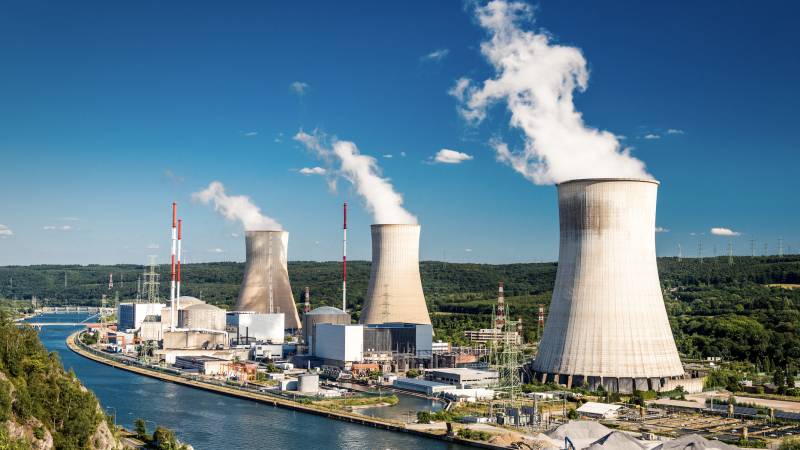
Amid rising energy costs and mounting climate pressures, nuclear power offers Pakistan a sustainable, economical, and reliable energy solution. As nations worldwide— including the oil-rich Saudi Arabia and the UAE — move towards nuclear energy, Pakistan, too, must recognise the immense potential of nuclear power.
Prioritising nuclear is therefore not just an option anymore, it is a strategic imperative for securing our energy, economic, and environmental future. Pakistan’s Planning Commission and others must act now to realise nuclear energy’s potential if we are to thrive in a turbulent global energy landscape.
Economic imperative
Pakistan’s reliance on hydrocarbon-based energy is not only economically burdensome but also unsustainable. With over 70% of Pakistan's oil needs met with imports, global price fluctuations directly impact Pakistan’s fiscal health, adding $23 billion to energy import bills for FY22 and causing inflationary pressures with an annual inflation rate of 7.2% in October 2024.
Comparatively, nuclear energy, despite high initial capital costs, proves more economical over time. According to the International Energy Agency, the levelised cost of electricity for nuclear power have fallen below that of coal and natural gas, with nuclear power currently generated at $60 per Mega Watts per hour (MWh), compared to $80 per MWh for coal and $70 per MWh for natural gas.
For added perspective, a nuclear power plant in the US produces electricity at around $0.08 per kilo Watts per hour (kWh) over its lifetime, while natural gas and coal can cost around $0.13 and $0.10 per kWh, respectively. By comparison, shifting to nuclear in Pakistan could lead to foreign exchange savings of approximately $2.5 billion annually and enhanced price stability for consumers. Nuclear power’s reliability and cost-effectiveness present a clear choice for Pakistan’s energy future.
'Eleven Kalabagh Dams'
Pakistan’s goal of achieving 40,000 Megawatt electrical (MWe) of nuclear power generation by 2050 would be equivalent to constructing approximately 11 Kalabagh Dams, said Pakistan’s pioneer DG SPD General Kidwai recently. This comparison underscores the immense potential of nuclear energy.
The Kalabagh Dam, with a projected capacity of 3,600 MW, remains a politically divisive project. Conversely, nuclear power aligns with the UN Sustainable Development Goals 2030, offering a sustainable energy solution that does not depend on our already strained water resources. The choice for nuclear becomes even clearer in light of these considerations, as it sidesteps political and environmental constraints.
Baseload and reliability
In Pakistan, where peak demand can vary dramatically and grid stability remains a challenge, nuclear energy’s ability to provide consistent baseload power is indispensable. Baseload means the continuous supply of electricity needed to meet basic energy demands at all times. Unlike renewable sources like solar and wind, which are dependent on weather and time of day, nuclear energy generates power 24/7. This is particularly important given recent fluctuations in water availability, which have impacted hydropower generation from the Tarbela and Mangla dams.
Global examples highlight the value of nuclear’s reliability. France, where nuclear provides 68% of electricity, maintains grid stability without exposure to energy price shocks that affects fossil fuel markets. For Pakistan, which aspires to reduce carbon emissions, nuclear offers a stable complement to our renewables, making our energy grid more resilient and less reliant on climate-dependent sources.
For Pakistan, nuclear power is the strategic choice that offers long-term cost savings, baseload power, and a path toward net-zero emissions
Safety and environmental responsibility
Concerns around nuclear safety, while understandable, are often based on historical incidents that do not reflect the advanced safety protocols of today’s nuclear plants. Modern nuclear reactors are designed with multiple failsafe systems, and their safety record is one of the best in the energy sector. The US Nuclear Regulatory Commission reports that nuclear plants have fewer accidents per energy unit than coal, gas, or even hydropower.
Pakistan’s own nuclear safety record exemplifies this. Facilities, like the Chashma Nuclear Power Complex, follow IAEA safety protocols rigorously. With over 50 years of safe nuclear operations, Pakistan’s track record affirms that nuclear energy can be developed and expanded safely. Unlike coal and gas plants that emit vast amounts of greenhouse gases, nuclear power is a low-carbon energy source, supporting climate goals.
Call to action
The need for nuclear energy in Pakistan’s energy portfolio has never been more pressing. It’s time to prioritise nuclear energy as a national imperative. The economic, environmental, and social advantages make it the clear choice for a sustainable future. A strategy focused on nuclear energy will lead to autarky, stabilise electricity prices, and contribute to environmental preservation.
Other nations, like the UAE and Saudi Arabia, are setting examples. Saudi Arabia, despite its vast oil reserves, plans to build two large reactors by 2040, while the UAE’s Barakah plant now supplies 25% of its electricity needs. Even the US, after decades of nuclear stagnation, has revived reactors and even reopened Three Mile Island for energy-starved giants like Microsoft.
Nuclear energy is not just a viable option but a necessary one for Pakistan’s sustainable growth.
Conclusion
The global nuclear revival shows that nuclear energy is invaluable in today’s energy market. For Pakistan, nuclear power is the strategic choice that offers long-term cost savings, baseload power, and a path toward net-zero emissions. Nuclear provides Pakistan with the means to achieve economic independence. Pakistan must act decisively, channeling public and institutional support toward nuclear energy. Embracing this path also reaffirms our role as a responsible nuclear state committed to peaceful, sustainable progress.

